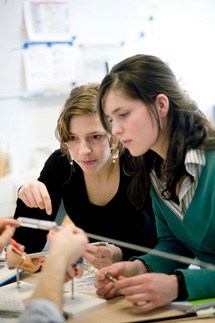MSc Biomedical Engineering
MSc Biomedical Engineering
The TU Delft master's programme in BioMedical Engineering is a multidisciplinary programme which aims to provide the students with both an understanding of biology and medical theory as well as highly specialised technical training in such fields as electrical, physics, material and mechanical engineering.
Students learn how to develop conceptual models from a technical perspective and you will work in close collaboration with physicians, researchers and other healthcare professionals, including on-site at the collaborating academic institutions.
If they graduate at EWI, many students follow the Medical Devices track (contact: Wouter Serdijn). Other students follow the Medical Physics track (contact: Richard Hendriks or Bori Hunyadi).
| BM41140 | Fundamentals in Biomedical Engineering | 6 EC | details | ||
| EE4555 | Active implantable biomedical microsystems | 5 EC | details | ||
| ET4127 | Themes in biomedical electronics | 4 EC | details | ||
| ET4252 | Analog integrated circuit design | 4 EC | details | ||
| ET4257 | Sensors and actuators | 4 EC | details | ||
| ET4386 | Estimation and detection | 5 EC | details |
Contact person
prof.dr.ir. Wouter Serdijn
Bioelectronics Group
Department of Microelectronics
See also
External link